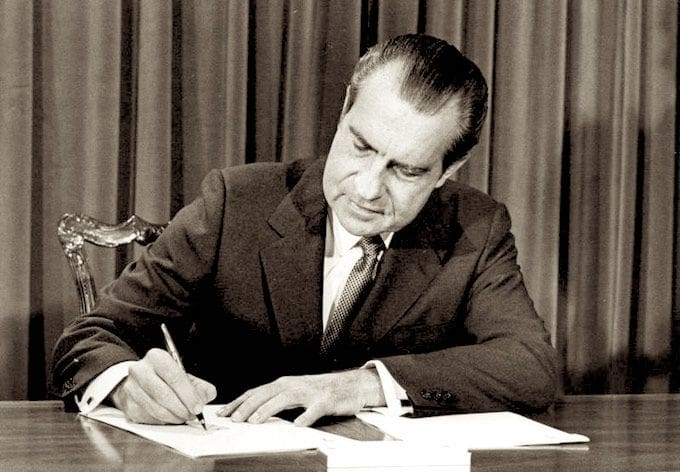There have been many proposals aimed at abolishing poverty via “market-friendly” measures — from Earned Income Tax Credits or Negative Tax schemes to Guaranteed Annual Income and Minimum Income Proposals. Some of these suggestions have had more Conservative backers than Liberal ones.
The typical conservative criticisms that welfare programs hurt desire to work and self-improve, or break up the nuclear family, and concern about expensive self-interested welfare bureaucracies, as well of course as more crass demagoguery about “black welfare queens” — all these have prevented for two generations creative and even serious consideration of new programs for solving political-economic-social problems. Given our new high tech economy, global trade/production and competition, and the Covid pandemic, it seems to me it is more than appropriate to look at new solutions — some of which have been discussed before but never tried.
Here is an interesting article on the “Family Assistance Plan” seriously proposed by the Nixon administration, pushed by Senator Patrick Moynihan, which unfortunately was derailed and never passed. It is a historical piece that gives insight into how we might proceed in the future. It appeared in a Foundation newsletter associated with Andrew Young, who himself proposed a “Guaranteed Annual Income” to address poverty and growing inequality when running for President:
All political solutions? An economic solution is to solve for the poverty inducing effects of Capitalism's natural rate of unemployment via the most cost effective, market friendly means available under our Constitutional form of Government.
I’m sorry my earlier post originally left out the article I mentioned. Here is the link which I had trouble finding before:
Guest Editorial by Almaz Zelleke, Associate Professor of Practice in Political Science, NYU Shanghai Fifty years ago, on August 8th, 1969, President Nixon p ...

basicincometoday.com
The Negative Income Tax was endorsed by no less a “free market conservative” than Milton Freidman himself. Conservatives have also generally endorsed programs like Earned Income Tax Credits, which are actually used today, but perhaps not with sufficient energy or scope.
Personally, I don’t see how anyone who supports Social Security or Medicare, or federal welfare assistance of any sort, or the right of our Federal government to tax, can object in principal to the programs I mentioned as being
political measures in violation of our “Constitutional form of government.” We are — as I’m sure you agree — today very far from any
pure capitalist system not dependent on ... law and government.
It is why I am advocating simplifying and reducing the cost of Government due to those programs by merely raising the minimum wage until those programs are not necessary.
Government programs are more expensive than simply paying more in minimum wages. The multiplier for those government programs has been estimated at around .8. In contrast even unemployment compensation has been measured with a multiplier of 2. In other words, simply raising the minimum wage and providing better access to unemployment compensation in our at-will employment States can reduce the Cost of Government while increasing economic activity as a result.
It is why I am advocating simplifying and reducing the cost of Government due to those programs by merely raising the minimum wage until those programs are not necessary.
I think you are very wrong if you believe that poverty alleviation can be accomplished simply by raising minimum wages “until those [other] programs are not necessary.” Introducing a higher minimum wage law on federal, state and/or local levels
can have a very positive (and “multiplying”) effect on the economy, but it also in certain cases can have
negative aspects as well, especially on small labor intensive businesses with low margins. It is no panacea.
As for government programs, they are not all the same. Some are designed precisely to avoid creating whole new bureaucracies and complicated “means testing.”
Finally, some social (local, state & federal) government welfare programs are simply costly
and necessary, and cannot be handled by the private economy. Not everybody can work, or is employable. Children and the ill, like the old and dying, need to be taken care of.
